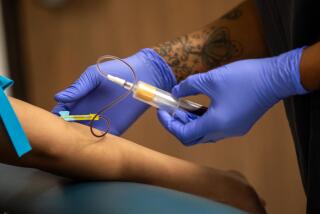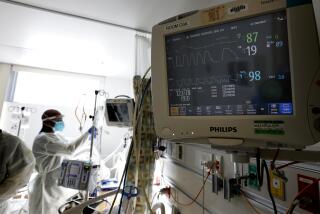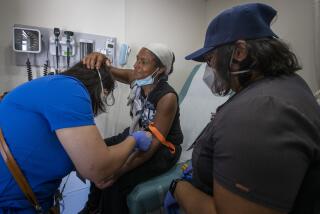Health Centers in Malls Need Shot in the Arm : Medicine: Hospitals pay E.N. Phillips Co. about $17,000 a month for the right to staff the screening units. But referrals and profits are proving elusive.
- Share via
Conveniently located across from See’s Candy at the Sherman Oaks Fashion Square, there’s a business called Testing 1-2-3 where shoppers can check their blood sugar and cholesterol levels.
The center also offers 39 other health screenings, all supervised by a doctor or licensed technician, and most of them are free. It’s one of nine shopping mall health centers opened by Woodland Hills-based E.N. Phillips Co. in the last two years, and so far, more than 50,000 people have taken advantage of the screenings.
How can the company survive giving free medical services? Hospitals pay E.N. Phillips about $17,000 a month for the right to staff the health centers, and the hospitals get referrals and access to the company’s database, which includes names, addresses and ages of customers. Company directors and market analysts say Testing 1-2-3, which opened its first center in late 1988, is the first business of its kind in the country.
But there’s one problem: The company, and most of its sponsoring hospitals, have yet to see a profit from the centers.
For the year ended Sept. 30, E.N. Phillips reported a loss of nearly $1.05 million on sales of $472,000. During the previous year, the company lost $615,000 with sales of $169,500. Meanwhile, at least one hospital decided not to renew its six-month contract with E.N. Phillips because the screening center brought in too few referrals. Several other hospitals said they too are losing money, but are willing to give the idea more time.
“We feel that the program has been beneficial for our outreach in the community,” said Dale Surowitz, executive vice president of Medical Center of North Hollywood AMI, which sponsors the Sherman Oaks center. “We can’t state that as a direct result of the screenings that people have come in here for treatment. We look at it as a long-term project.”
Many new companies start out posting losses, but E.N. Phillips also has to worry about the cash drain on its company. For the nine months ended June 30, the company had a negative cash flow of $380,000, compared with a $200,000 negative cash flow over the same period a year earlier.
To bolster its finances, the company has raised about $800,000 since July by offering its initial investors a chance to buy more stock. The company now says it has $698,000 cash on hand. E.N. Phillips Chairman Hal B. Phillips said if additional centers are not opened as scheduled and the company runs out of cash, directors hope to try a private stock placement with a goal of raising more than $3 million.
In the meantime, much of the company’s resources have been spent on marketing. It costs about $85,000 to start up a center, Phillips said, and rent per store runs about $2,500 to $3,500 a month.
Despite the slow start, Phillips, 60, said he is confident the company will begin making money when more centers open. He said Testing 1-2-3 should break even when the 15th center is opened, he hopes by the middle of next year.
Phillips, who has 39 years of experience in marketing and public relations, said the concept is viable because studies have shown that 65% of the public doesn’t have a personal physician and 70% regularly shops in malls. By sponsoring screening centers, the idea is that hospitals and doctors can reach that market while providing a valuable community service free.
Also, Phillips said, the centers offer a competitive edge in an industry where one of every two hospitals is losing money. By generating business for their physicians, he said, hospitals will be better able to keep patients and add new ones. “Hospitals today are looking at every area that gives them an advantage because of the high cost of medical delivery,” Phillips said. “They have to continue to grow by reaching more and more people.”
Maybe so, but Doctors Hospital of Montclair and Ontario Community Hospital did not renew their lease at the Testing 1-2-3 center in the Montclair Plaza because of a shortage of referrals. The sister hospitals, both operated by National Medical Enterprises, began sponsoring the center in June and closed it earlier this month. So far, E.N. Phillips hasn’t found a replacement hospital tenant for the Montclair site.
“We were spending many, many thousands of dollars on a monthly basis and not recouping even a small portion of that,” said Jeff Merald, Doctors Hospital’s director of marketing. He said the hospital spent $15,000 to $20,000 per month on the center.
The center generated only about 25 referrals per week from the 250 to 400 people screened, he said, but most of them were ineligible for hospital services because they were members of health maintenance organizations. Merald said on average only one person a week had insurance that would cover a doctor’s visit at their hospital. “That person would have to be extremely ill to cover the costs” of the Phillips program, Merald said.
Phillips said that isn’t a typical response, and that about 15% of people who receive screenings at his centers are referred to hospitals. In addition to the Sherman Oaks and Montclair centers, the company operates centers in Palm Springs, Sacramento, Lakewood, Redondo Beach, Santa Ana, Cupertino and Concord.
At a typical center, the hospital’s advertising starts as soon as people walk into the screening center, where the hospital’s name is printed in large letters on a facing wall. Visitors can also sort through a variety of pamphlets publicizing the hospital’s services. At each center, E.N. Phillips employs between two and three administrative personnel, and there are usually an equal number of hospital employees, although additional technicians or doctors may be scheduled on days when special screenings are offered.
Most of the sponsoring hospitals said they like the convenience of having someone else run the centers, even though they have their own marketing departments that occasionally sponsor daylong health screenings in malls. Operating a long-term screening center entirely on their own would be too costly and would require additional marketing expertise, they said.
Stan Otake, director of marketing and community relations for Doctors Hospital of Lakewood, said his hospital expects to spend $350,000 to $500,000 annually to sponsor the Testing 1-2-3 center at the Lakewood Center Mall. About 20 out of the roughly 170 people who are screened at the center each week show up at the hospital for appointments, he said. Such patients usually do not bring in much money for the hospital because their conditions are minor, he added.
Otake said the hospital has not decided if it will renew its trial operating agreement with E.N. Phillips when it expires in February.
Peter Blowitz, president of Toluca Pacific Securities Corp. in Toluca Lake, which deals in E.N. Phillips stock, remains upbeat about the company’s future. “They are on the verge of projectable profits,” he said. The stock’s price over the past year has ranged from $1.12 to about $2 per share.
Phillips, a Santa Monica native who has lived in the San Fernando Valley most of his life, said he got the idea for mall-based health screening centers eight years ago after he organized a stroke prevention week to generate business for a Palm Desert cardiovascular laboratory. He said the program, which offered free health screenings at malls, was so successful that he continued it for six months.
He said he began laying the groundwork for Testing 1-2-3 three years ago with start-up capital from the sale of a property. He said, “I think we have a winning concept. Anytime you can serve the public and make a profit, I think you’ve got longevity.”
Phillips said he is not surprised that hospitals aren’t seeing immediate benefits. He said the company’s aim is to plant the seed for a doctor-patient relationship that may not show profits until patients return to the hospital a second or third time, perhaps to undergo tests or surgery.
More to Read
Inside the business of entertainment
The Wide Shot brings you news, analysis and insights on everything from streaming wars to production — and what it all means for the future.
You may occasionally receive promotional content from the Los Angeles Times.










